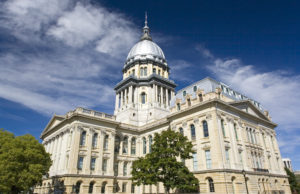
Ill. bill requires insurers to cover OEM procedures; exempts parts, calibration tools
By onAssociations | Business Practices | Insurance | Legal | Repair Operations
A new Illinois bill would forbid insurers from requesting deviations from OEM repair procedures except for parts or ADAS calibration tools.
The Alliance of Automotive Service Providers of Illinois is advocating for House Bill 3133, which is nearly identical to 2020’s House Bill 4916. That predecessor failed to go anywhere, but that’s probably a function of the COVID-19 pandemic arising after HB 4916’s introduction late last winter.
HB 3133 is more streamlined than 2019’s Senate Bill 2104, which passed that chamber but was amended by the House into a completely different measure regarding the pharmacy industry.
AASPI Executive Director Brian Wojcicki on Thursday said work had been done to simplify and narrow down the language into what was visible today.
“No insurer shall specify the use of repair procedures that are not in compliance with original equipment manufacturer directives for those parts in the repair of an insured’s motor vehicle, nor shall any repair facility or installer use repair procedures that are not in compliance with original equipment manufacturer directives for those parts to repair a vehicle,” 2021’s HB 3133 would add to Section 155.29 of 215 Illinois Compiled Statutes 5. “However, this subsection does not require the use of original equipment manufacturer repair parts or original equipment manufacturer advanced driver assistance system calibration tools that may be recommended in an original equipment manufacturer directive if the repair parts or calibration tools used are at least equal in like kind and quality and otherwise conform to original equipment manufacturer directives.”
HB 3133 also rewrites Section 15 of the Automotive Collision Repair Act, 815 ILCS 308, to require that auto body shops write estimates in accordance with OEM procedures.
Again, exemptions exist for parts and ADAS calibration tools.
“The estimate shall include the use of repair procedures and replacement parts that are in compliance with original equipment manufacturer directives for those parts,” HB 3133 states. “However, this subsection does not require the use of original equipment manufacturer repair parts or original equipment manufacturer advanced driver assistance system calibration tools that may be recommended in an original equipment manufacturer directive if the repair parts or calibration tools used are at least equal in like kind and quality and otherwise conform to original equipment manufacturer directives.”
Wojcicki noted that “the reality in Illinois” was language on the books had permitted the idea of like kind and quality alternative parts for a while. He said no lawmaker would want to remove something that had “already been in the marketplace.”
The Alliance for Automotive Innovation, which represents virtually all major OEMs, has also proposed parts exemptions as a compromise within various repair procedure bills it’s pursued nationwide. Wojcicki said prior language that sought to clearly allow the usage of alternative components has led to some parts interests dropping their opposition.
Wojcicki associated the calibration exemption at least in part with the auto glass industry’s position on the operation.
In 2019, SB 2104 sponsor Sen. Thomas Cullerton, D-Villa Park, introduced on the Senate floor an amendment declaring an OEM procedures exemption for “glass repair, replacement, and associated advanced driver assistance system calibration covered by the Automotive Repair Act.” That language passed the full Senate.
Wojcicki called the bill “the direct result of negotiations” and “natural compromises.” But he also said no consensus existed yet among all the stakeholders and characterized the text of HB3133 as “starting language.”
The point was to “embolden repairers to be able to do good repairs and have some protections.”
Sponsored by Assistant Majority Leader Elizabeth Hernandez, D-Cicero, HB 3133 is currently before the Rules Committee.
Wojcicki didn’t anticipate HB 3133 would end up in legislative limbo waiting for a committee hearing until the bill died.
“I’m confident we’ll have a hearing on the bill this year,” he said.
Wojcicki also said “I would not be worried” about finding sponsors in the Senate to introduce a companion bill. He said AASPI decided to start the legislation in the House because it already had been shown to draw support in the Senate.
We asked if the exemptions in the bill would undercut body shops who made it a policy to only use OEM parts and OEM calibration processes.
“It’s a fine line to walk,” Wojcicki said. But he pointed out that alternative parts already are a reality under Illinois law.
AASPI hoped anyone trying to be 100 percent in compliance with OEM dictates wasn’t undercut, he said. The hope was that tying repairs to OEM procedures in general produced a return on shops’ investment, he said.
The bill was meant to “embolden repairers to be able to do good repairs and have some protections,” Wojcicki said.
Be heard: Illinois lawmaker contact information can be found here and here.
Featured image: The Illinois Capitol is shown. (benkrut/iStock)
